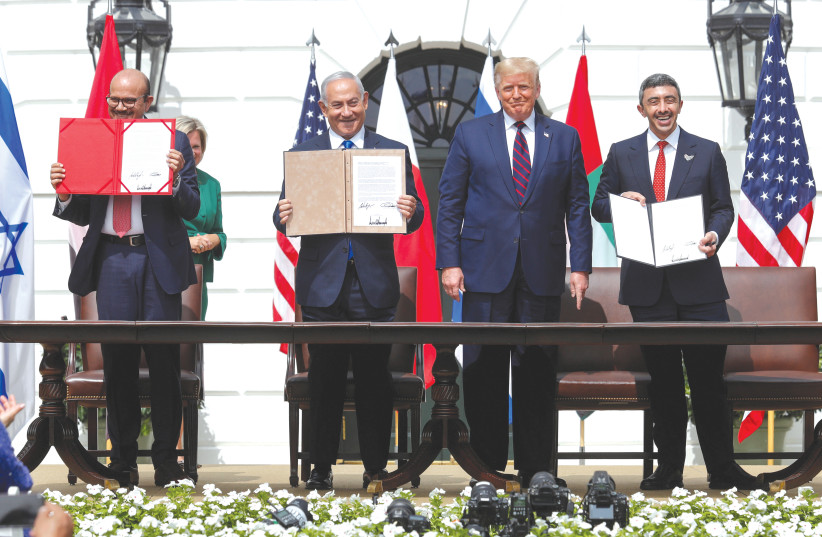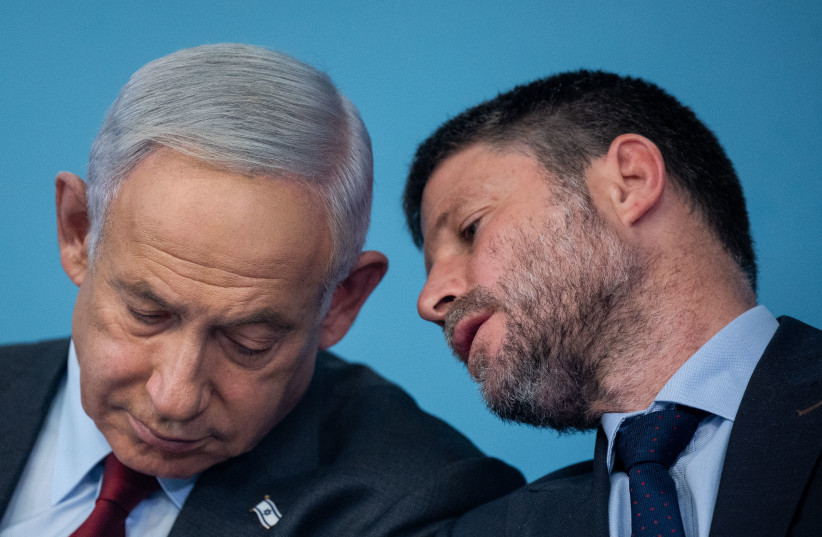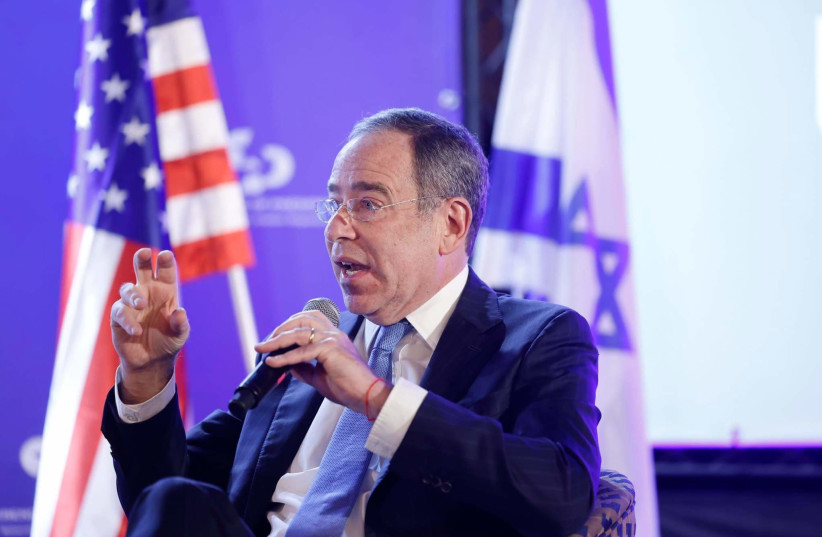90 days in government: Netanyahu’s coalition is a diplomatic crisis on steroids
It took Prime Minister Benjamin Netanyahu just three months to become a persona non grata in Washington.
If there were a Guinness Book of World Records for the actions of an Israeli premier, then Netanyahu would have just set a new one for descending from grace faster than any other leader in the country’s history.
It’s an even more stunning fall, given that he is considered to be one of the most skilled and veteran diplomats in the international arena.
When he returned to the country’s helm on December 29, 2022 – wresting it from a government in power for only 18 months led by two diplomatic novices, former prime ministers Naftali Bennett and Yair Lapid – there should have been a smooth ascent to a series of quick diplomatic success.
After all, Netanyahu left office in June 2021 at his height, having secured normalization deals with four Arab states under the rubric of the Abraham Accords.
 THE HISTORIC Abraham Accords, signed in 2020, have already led to rapid growth in trade and cooperation in a wide range of areas from investment and innovation to food security and health. (credit: TOM BRENNER/REUTERS)
THE HISTORIC Abraham Accords, signed in 2020, have already led to rapid growth in trade and cooperation in a wide range of areas from investment and innovation to food security and health. (credit: TOM BRENNER/REUTERS)Initially, Netanyahu’s rhetoric focused on how he planned to restore order after the chaos that had ensued in his absence.
Instead, his first 90 days have been a nightmarish stretch of crisis diplomacy on steroids, particularly with respect to the United States, which is Israel’s major global ally, and Jordan, which is a major regional strategic ally.
In reality, that high-stakes drama was sewn into the fabric of his new coalition so that the outcome was almost preordained from the start, given the vast gulf between the political ideologies of his coalition partners and those of his Western and regional allies. The question was how the crises would play out and not if they would occur.
Slip of the tongue fiascoes
Netanyahu might have promised his allies that his “hands are on the wheel,” but from the start he found himself working to douse the diplomatic fires sparked by the actions and statements of his coalition partners.
He had been in office less than a week when National Security Minister Itamar Ben-Gvir created a crisis with Jordan, over which Israel’s envoy was summoned when he visited the al-Aqsa Mosque compound on the Temple Mount. He did not pray on the Mount or enter the mosque, but the international community widely condemned the visit, fearing Israel would violate the status quo and lift the ban on Jewish worship there.
Finance Minister Bezalel Smotrich sparked a second crisis with Jordan when he delivered a speech at a private event in Paris from a podium adorned with a graphic that appeared to place the Hashemite Kingdom within Israel’s borders. In that speech, he also stated that the Palestinian people does not exist.
Jordan summoned Israel’s envoy again and warned Netanyahu that the 1994 peace treaty had been violated. Israel had to scramble to assure Jordan that it has no territorial ambitions regarding the Hashemite Kingdom and that it cherishes the peace treaty.
Smotrich also earned US condemnation for his Paris speech, as well as for the one he made at a conference in Israel in which he called for the IDF to wipe the West Bank Palestinian town of Huwara off the map, a statement he later attempted to walk back, explaining that he only meant that terrorists there should be routed out.
 Israeli Prime Minister Benjamin Netanyahu and Finance Minister Bezalel Smotrich seen during a press conference, at the Prime Minister’s office in Jerusalem, on January 25, 2023. (credit: YONATAN SINDEL/FLASH90)
Israeli Prime Minister Benjamin Netanyahu and Finance Minister Bezalel Smotrich seen during a press conference, at the Prime Minister’s office in Jerusalem, on January 25, 2023. (credit: YONATAN SINDEL/FLASH90)Israel also had to apologize to the United Arab Emirates for tongue-in-cheek comments that Transportation Minister Miri Regev made about not liking Dubai, which came at a time when the Emirati ally was already nervous about domestic turmoil in Israel and its impact on its nascent relationship with the Jewish state.
Democracy and the US crisis
It was obvious from the start that a Netanyahu-led government whose members disavowed Palestinian statehood and wanted to promote settlement development and impose de facto sovereignty over Judea and Samaria would be at odds with the Biden administration.
Netanyahu, long a veteran of such sharp policy disputes, was expected to massage the differences, chalking it up to a disagreement among close friends. The fact that his friendship with US President Joe Biden goes back to the 1980s was seen as an asset for such a tried-and-true strategy.
Instead, Netanyahu pushed the envelope of that dispute, including by authorizing 10 West Bank outposts as settlements. The US responded by failing to veto a United Nations Security Council statement against Israel for the first time in eight years. In a rare move, it also summoned Ambassador Mike Herzog to the State Department over the Disengagement repeal in northern Samaria.
Netanyahu had been in office for less than two months when a new fissure in Israeli-US ties emerged – his plans to overhaul Israel’s judiciary, a move that he has argued would strengthen Israeli democracy.
It was a message that he failed to convincingly deliver to his Western allies, chief among the Biden administration, which was instead swayed by the program’s critics that the plan risked turning Israel into a dictatorship.
Biden and US Secretary of State Antony Blinken both spoke out against the plan, as did US Ambassador Tom Nides.
Between concerns over Israeli democracy, anger at settlement activity and frictions with Netanyahu’s coalition partners, an invitation to Washington which was expected to be issued as early as January never arrived.
 US Ambassador to Israel Tom Nides, as soon on February 19, 2023. (credit: MARC ISRAEL SELLEM/THE JERUSALEM POST)
US Ambassador to Israel Tom Nides, as soon on February 19, 2023. (credit: MARC ISRAEL SELLEM/THE JERUSALEM POST)A series of sharp public exchanges turned into one of the worst public crises in US-Israeli relations this week when Biden clarified that Netanyahu would not be invited to Washington in the near future and asked Netanyahu to drop the reform in favor of an amended version that would be worked out with both coalition and opposition politicians.
It was a stinging blow to Netanyahu, who derives his power on the international stage in part from the belief that he has Washington’s ear.
Flailing anti-Iranian diplomacy
The US-Israeli crisis is also a sign of a failing Iranian policy, which rests in part on the international support for any potential IDF military action against Iran’s nuclear program, most especially from the United States.
Netanyahu’s inability to talk to Biden robs him of the option to personally secure US support for such a move and/or any other coordinated anti-Iran diplomatic options.
While it’s true that Israel-US dialogue will continue, Netanyahu has always been the chief advocate against Iranian nuclear weapons.
Even before Biden’s snub, Netanyahu’s ability to head a global anti-Iran campaign was called into doubt, first by his inability to quell the chaos in Israel over judicial reform. Saudi Arabia’s decision to reestablish diplomatic ties with Tehran was seen in part as a commentary on its lack of faith in Israel’s role as a regional military bulwark against Tehran and Netanyahu’s already diminished ties to Washington.
Netanyahu traveled to four European capital – Paris, Rome, Germany and the United Kingdom – without any substantive public gains on the Iran front, not even an agreement to designate Iran’s Islamic Revolutionary Guard Corps as a terrorist entity.
His decision this week to publicly fire Defense Minister Yoav Gallant, even though he has yet to formalize that action, could set his Iran strategy back by at least three months. A new defense minister will need that time to get up to speed, and Gallant’s work over the past months will now be lost.
 Minister of Defence Yoav Galant and IDF Chief of Staff Herzi Halevi seen during a tour on near the border with Lebanon, northern Israel, March 16, 2023. (credit: DAVID COHEN/FLASH 90)
Minister of Defence Yoav Galant and IDF Chief of Staff Herzi Halevi seen during a tour on near the border with Lebanon, northern Israel, March 16, 2023. (credit: DAVID COHEN/FLASH 90)It was telling that one reporter asked the State Department if it still trusted Netanyahu’s judgment.
Netanyahu’s willingness to weaken Israel vis-à-vis Iran for political gain has some questioning his decision-making abilities on security issues, precisely when he most needs people to believe that when he says Iran is dangerous, it is.
Some gains turned to loses
Netanyahu entered office promising new normalization deals, particularly with Saudi Arabia, a move that he said would help end both the Israeli-Arab conflict and the Israeli-Palestinian one.
Initially, it seemed as though Israel’s relations with its regional partners were on track. There was talk that Netanyahu’s first foreign visit would actually be to the United Arab Emirates to celebrate the Abraham Accords.
The Negev Forum – a regional grouping of the UAE, Bahrain, Morocco, Israel and Egypt together with the United States – held a large gathering in January of government officials. It was billed as the largest such regional gathering since the 1991 Madrid Conference.
The United States also convened a quintet meeting with officials from the Palestinian Authority, Israel, Jordan and Egypt, first in Aqaba and then in Sharm el-Sheikh. It was billed as the first substantive forum for Israeli-Palestinian talks since negotiations between the two sides broke down in 2014.
But all the initiatives fell apart. The UAE never extended an invitation to Netanyahu. An announced foreign ministerial meeting of the Negev Forum set for Morocco in March never took place. US efforts at Aqaba and Sharm el-Sheikh were overshadowed, first by Palestinian terrorism and vigilante settler attacks, and then by Israeli government actions, including the advancement of plans for settlement homes and the repeal of the Disengagement Law as it applies to northern Samaria.
Not everything has been a loss
There have been some quick diplomatic highs, particularly in those arenas delegated to Foreign Minister Eli Cohen.
He flew to Sudan to secure its agreement to finalize its inclusion in the Abraham Accords, after the country initially signed on to them in January 2021. Poland and Israel reached an agreement that would allow for the restoration of Israeli high school trips to the sites of the World War II concentration camps. The United Arab Emirates finalized its free trade agreement with Israel.
 Foreign Minister Eli Cohen seen with his Italian counterpart on March 13, 2023 (credit: SHLOMI AMSALEM/GPO)
Foreign Minister Eli Cohen seen with his Italian counterpart on March 13, 2023 (credit: SHLOMI AMSALEM/GPO)Cohen in particular helped upgrade Israel’s status in Western eyes vis-à-vis Israel’s policy toward Russia, when in February he became the first high-level Israeli official to visit Kyiv. He also signed a 2030 road map with Great Britain that will improve cooperation and advance work toward a free trade agreement.
In addition, Oman opened its airspace to Israel, Azerbaijan became the first Shia Muslim country to inaugurate a Tel Aviv embassy, and Netanyahu announced that the country was moving forward with the sale of its Arrow-3 defense system to Germany.





Comments are closed.